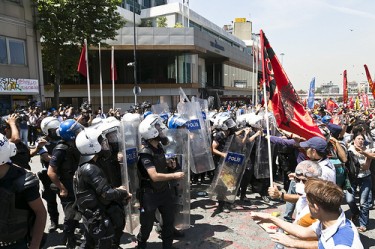While Istanbul continues to be rocked by mass demonstrations [1] [en] against Prime Minister Recep Tayyip Erdoğan, the RuNet has been actively observing and discussing the events. Turkey is a popular holiday destination with Russians, who are drawn there by its beaches, proximity, low prices and a visa-free travel agreement with Russia. Last year alone nearly 3 million Russians visited Turkey. While some interest in current events there can therefore be chalked up to concerns for non-refundable travel packages, Russia itself has been no stranger to street protests in the last two years. Many Russians were quick to draw parallels: both between the two protest movements and the two political leaders.
From the start, most Russian sympathies have tended to be with the protesters, a phenomenon the controversial writer and head of the Other Russia opposition group Eduard Limonov ascribed [2] [ru] to the Russian national character:
Мы, российские граждане, всегда надеемся, что восставшие против своих правительств победят, всегда инстинктивно встаём на их сторону. Объясняется этот феномен крайне просто. Поскольку мы ненавидим своё правительство и всё руководство нашей страны, и хотим, чтобы оно оставило нас, как можно быстрее; мы солидаризируемся инстинктивно с любой борьбой против правительств.
We Russian citizens always hope that those rising up against their governments will win, instinctively flocking to their side. This phenomenon is quite easily explained. As we hate our government and all those who rule our country and want for them to leave us, the quicker the better, we instinctively express our solidarity with any struggle against the state.
 [3]
[3]“Unrest in Istanbul”, June 11, 2013, Photo by Eser Karadağ [4] CC2.0
Limonov, however, went on to explain that in Turkey's case the sympathy was not just a reflex. Noting the centrality of environmentalism to sparking the Taksim protests, Limonov wrote “the Turks appeared very similar to us, like Chirikova and her Khimki Forest [5] [en].”
Limonov wasn't alone, as many Russians took to Twitter and LiveJournal to express their support of the protesters. Arkady Babchenko, a Russian journalist who blogged about the Istanbul protests from the ground, was highly critical [6] [ru] of Erdoğan's response (he was later detained, beaten [7] [ru] and deported from Turkey [8] [en].)
По поводу переговорщиков (вчера одиннадцать человек ездили к Эрдогану на переговоры, насколько я понял, ни о чем не договорились, но это не точно) – не то, чтобы разброд и шатание, но разговоры уже начались. Очень грамотный ход со стороны Эрдогана. Разделяй и властвуй. Умно. У Путина учится.
As for the negotiators (yesterday [June 12, 2013] eleven people went to Erdoğan for negotiations, as far as I known they haven't reached any agreement, but that's not clear) — it's not so much confusion and disharmony [that they've caused], but people have already started to talk. An expert move on Erdoğan's part. Divide and rule. Clever. He's learning from Putin.
Comparisons of Erdoğan to Putin abounded, particularly on Twitter. Real_Estate_Mos [9] [ru] tweeted:
Эрдоган – это такой турецкий Путин..
Erdoğan is a sort of Turkish Putin
Riffing on both leaders’ fondness for presenting themselves as public servants, sergeiolevskii [10] [ru] tweeted:
Эрдоган: “я слуга народа”.
Путин: “я как раб на галерах”.
Чего же так сложно избавиться от этих слуг и рабов?
Erdoğan – “I'm a servant of the people”
Putin- “I work like a galley slave”
Why is it so hard to get rid of these servants and slaves?
Pro-Putin Russians were reticent to voice their support for Erdoğan, under whose premiership Russo-Turkish relations have soured, particularly over the issue of Syria. Nevertheless, Nikolai Starikov, a hard-line Putin supporter, writer, and conspirologist stated [11][ru] that the protests had been whipped up by the Americans in order to create disorder in Turkey and force the government to support Syrian opposition fighters, which Starikov alleges they have been trying to avoid:
Не хочет – нужно заставить. И вот «турецкая весна» на улицах. Погромы, драки с полицией, попытки штурма офисов правящей партии. И все из-за планов сноса одного парка, как говорят нам СМИ? Полная чушь. Цель беспорядков – заставить Турцию активно вписаться в сирийский конфликт и помочь исламистам.
[Turkey] doesn't want [to get involved] so they need to be compelled. And there you have it: “The Turkish Spring” is on the streets. Pogroms, clashes with police, attempts to storm the offices of the ruling party. And all from plans to demolish a single park, as the media says? Complete rubbish. The aim of the disturbances is to force Turkey to sign up for the Syrian conflict and help the Islamists.
In the past Starikov has repeatedly claimed the US State Department is behind Russia's opposition movement, as an active means of weakening the country.
Twitter user aliciamillor [12] [ru] made an argument in a series of tweets [13] [ru] that since Erdoğan had offered to hold a referendum on the park, he was better than some other western politicians:
Браво! Эрдоган предложил провести референдум. Того же самого требовали фр-зы по поводу гей браков. Олланд отказал в груб форме,собаками и газом. Вывод – Эрдоган больше демократ чем Олланд.
Bravo! Erdoğan has proposed holding a referendum. The French demanded the same thing for gay marriage. [French President] Hollande refused this very rudely, with dogs and [tear] gas. Consequently, Erdoğan is a bigger democrat than Hollande.
One Russophone group that did seem to mostly support Erdoğan were citizens of the Central Asian republics, most of whom are Turkic peoples, ethnically and linguistically related to the Turks of Anatolia. One user [14] [ru, uz] in Uzbekistan (whose own president responded to popular protest in 2005 by massacring [15] [en] hundreds of people) applauded Erdoğan [16] [ru] for his relative restraint:
Эрдоган поступил правильно , предупредил , не отреагировали , и теперь выгнал всех нахрен !!! и вообще можно было без предупреждении
Erdoğan has acted correctly, he warned [the protesters], they didn't react, and now he's gotten them the hell out of there!!! and anyway, he didn't have to warn them
Another user, Eva_Alli [17] [ru, kg] of Kyrgyzstan, whose country has also been plagued by unstable government, also praised [18] [ru] Erdoğan's steadfastness.
Эрдоган красавчик. нам бы такого. знает, что делает, имеет свою точку зрения и ни перед кем не пасует. лев в мужском роде. одним словом.
Erdoğan is one cool dude. Would that we had someone like that. He knows what he's doing, has his own point of view and nothing gets past him. A sort of a lion, in a word.
 [19]
[19]Leonine Erdogan is anything but cowardly, according to some RuNet users. YouTube screenshot. June 18, 2013.
Each of these groups of RuNet users perceives Turkey through the prism of their own domestic concerns: members of the opposition see an example to follow, while regime supporters see the disturbances as evidence of foreign meddling and western hypocrisy. Conversely, Central Asians seem to envy their Anatolian cousins for having a more moderate or more decisive leader than they do. While social media has clearly made it much easier for users to closely follow and discuss events thousands of kilometers away, their concerns suggest that for many, all politics is still local.